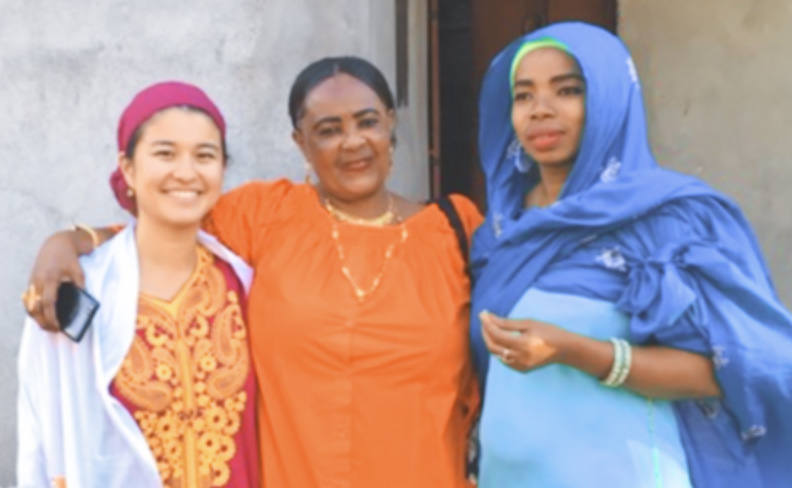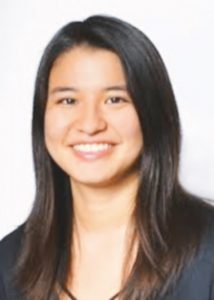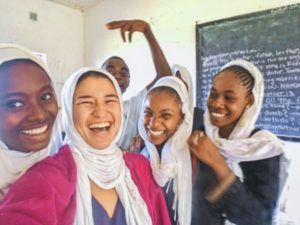
Kako Yamada is shown here with her host moms from Pre-Service Training, a three-month training period conducted near the capitol.
Life in Comoros as a Peace Corps Volunteer and why this service is life-changing in more ways than one.
By Kako Yamada
The Fajr prayer echoes through the concrete alleyways of Mitsamiouli. The roosters cock-a-doodle-doo, cuing the sun rays to peek into my room. It is 4:30 a.m. My host mom, host dad and I make our way into the dawn. As we mount up to the next village, the forest of palm trees and blue beach present themselves in front of us. My pregnant mom pants as my dad teases and pulls her along. Some days we go down to the beach for a polar plunge — me and my mom screaming as we enter the water, an expression that doesn’t necessitate translation. These are some of the fond memories from the beginnings of my time now as a Peace Corps Volunteer.
Peace Corps was a program started by President John F. Kennedy in 1961 to promote world peace and friendship. Since then, it has sent more than 235,000 volunteers to more than 141 countries with the mission to (1) “help the peoples of interested countries and areas in meeting their needs for trained men and women,” (2) “promote a better understanding of the American people on the part of the peoples served” and (3) “help promote a better understanding of other peoples on the part of Americans.”

Kako Yamada
I am a part of the smallest Peace Corps post at the moment with a total of 25 TEFL volunteers and two Peace Corps Response Volunteers. Each one of our experiences are different, coming from various backgrounds and living in different villages in Comoros, an island archipelago in the Indian Ocean made up of Grand Comore (Ngazdija), Moheli (Mwali), Anjouan (Nzouani) and Mayotte (Mawore).
While the country declared independence from France in 1975, Mayotte voted to remain a French region, which, along with the numerous coup d’états and unstable governance, remains a point of contention. The country of about 814,000 people is 98 percent Sunni Muslim and is considered to be one of the poorest countries in the world.
That is the kind of macro-level information one might find on the Internet. And while I hesitate to write a piece only six months in-country, I hope to provide a snapshot and share some of my developing thoughts, observations and remaining questions.
In addition, I hope that we can also recognize our global positionality as we reflect on 90 years of the JACL and the ongoing fight to protect civil rights. For example, it is significant to me, as a child of immigrants, to be able to potentially help Comorians who are looking to immigrate to an English-speaking country.
Behind this lies my family history and the fact that in 2019, my American citizenship is valid enough as a Shin-Nikkei to participate in a program started by an Executive Order. Even more, the existence of my job as an English teacher and the motivation for Comorians to learn English for work and education-related reasons cannot be untangled from a history of political and economic power play, where English has become the global language.
Comoros is separated from the rest of the world by sea; however, it is connected to the world through the movement of people and engagement in a global system. As global citizens who also navigate in this complex web, I hope that my reflections of life 10,000 miles away can feel close to home and add to conversations already being had.
A Day in the Life
The picturesque northern capital of about 9,000 residents that I now call home is decorated with a beachside market, restaurants, food trucks, a stadium, a library, multiple banks and schools.
My days here consist of teaching, tutoring, playing sports, shopping at the market, strolling through the village, spending time with family and eating. My primary assignment through the Peace Corps and the Ministry of Education is to teach English to sixth-, seventh- and eighth-graders at two public middle schools.
One reality of schooling here is that many parents have opted to enroll their children in private schools that are not affected by teacher strikes. Public school teachers strike, for they are often unpaid by the government, sometimes for as long as three months or more. Albeit the dwindling retention, I thoroughly enjoy our classes of 10-25 students, who are excited to participate in between their groany “teacher, I’m hungry” and “teacher, *gestures going to pray.*” Lesson planning and teaching for 16 hours takes up most of my weekday mornings, followed by washing the dishes for the family or hand-washing my clothes.
My afternoons consist of learning the local language, attending soccer practice for one of three teams, practicing taekwondo, going to the market to chat and barter with friendly vendors, eating from a large plate with my family of six and watching Mexican telenovelas dubbed in French when there is electricity. I am lucky to be able to say that the days fly by; it is my understanding that boredom and loneliness can be difficult parts of many people’s service experience.
Service as a Task vs. Life as Service: Availability, Tenacity and Discipline
Being placed in a bustling village has provided me with activities to interact with many new people, but it also came with the challenge of balancing the needs of the community and my own capacity.
The importance of meeting the needs of a community rather than forcing ideas upon them, creating sustainable projects through partnerships and respecting the exchange of cultures in order to stay away from neocolonialist tendencies have become repeated pillars in recent development work. While these ideas are crucial bases, I have found that the interactions are at the person-to-person level, and people are more complicated than ideas or entities and therefore necessitate time, patience and availability to understand.
With abundant requests for secondary projects, including English clubs for adults and children, radio shows and work with the National Parks, I considered putting aside the things that make me happy, such as playing sports, in order to teach more English. I wondered if I would be serving “better” if I used the two hours that I work out to teach the countless adults asking for English lessons.
However, what is special, complex and realistic about Peace Corps is that service cannot just be from 9-11 a.m. on a Monday. I am not just a two-dimensional English teacher; I am a person with multitudes and service here is life itself.
It engulfs the hours I spend as the only woman in the whole stadium playing soccer, the time I spend discussing my family’s Japanese background and the late-night girl talks I have with my host mom.

High spirits on the last day of class. At the Mahad, or religious public middle school, students have a dress code.
This is different from the way I conceptualized service in the States. For example, my job as an English teacher to refugees at the Nationalities Service Center was confined to my work hours. In my engagement with organizing the protest against the Berks Family Detention Center, I wasn’t even able to meet a detained family.
Amongst the business of life in America, service was another task in a day; something to be checked off of a to-do list. And no matter how genuine the intention and passion, I was looking to yield something: perhaps a certain turnout at the protest, a change in legislation or a wage.
When my life is service instead of service being a part of my life, it is much harder to try to define things. Certainly there are projects with intended outcomes and measurable impact; at the same time, it is exciting and challenging that the other things I do in my day could have positive or negative ripple effects.
This keeps me on my toes and calls for me to be better by being responsible for more than just myself. For example, I realized that the time I use scrolling through Instagram could otherwise be used singing English songs with my sister. Procrastination remains one of my worst habits, but I am more motivated to kick it now that I understand my time is also other people’s time. To be available is a part of my job, and it is refreshing to say, “Yes,” to helping people without looking for anything in return.
I have also learned ya uzisa ye tsi djinga, or “the one who asks is no fool.” I learned this saying when I was hesitating to ask to practice with the women’s national team and in joining the men’s soccer team. In Comoros, the one who asks, the one who tries, is the one who will be happy because the response is often a warm karibu or “welcome.”
In addition to getting me out of my shy shell, the experience of representing Americans, women or a person of color can give me extra strength. For example, I felt extra wind under my wings when doing sprints amongst 30 men on my soccer team because me giving up wouldn’t just be Kako giving up but would reflect and may impact the experience or image of girls or Americans. This awareness has ingrained in me a sense of tenacity.
I hope that my actions in the classroom, at the stadium, in the streets, at home, sometime in my life could possibly positively impact someone. It could be a student who learned to study with flashcards, a girl who feels more comfortable participating in sports or, well, I don’t know, and that’s OK.
While I know that I will learn much more in my coming months of service, I will continue to interact, connect, listen, attempt to share, learn, smile, laugh and do what I love, find new things I love and push through the times when I may feel useless and, above all, stay here.
Kako Yamada is a member of the New York JACL chapter. She is currently working in Comoros as a Peace Corps Volunteer in the education sector. Follow her story on Instagram at @ka_ko.mo_sava.



